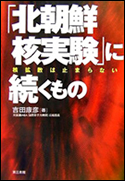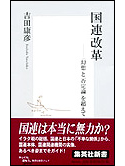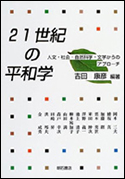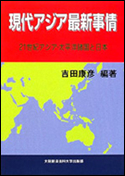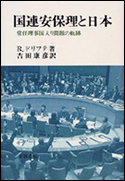2003年10月01日
【2】How to Find a Permanent Solution to North Korea's Human Rights Issues(December 2004)
INTRODUCTION
I am pleased to be able to attend this symposium as a citizen of Japan. First of all, I would like to introduce myself briefly. I am professor at the Osaka University of Economics and Law, teaching peace studies and international relations. Before entering academia, I spent 10 years in the United Nations, working in the field of public information in New York, Geneva and Vienna. It was in 1989 while I was Director of Public Information for the International Atomic Energy Agency(IAEA) in Vienna that a clandestine nuclear program in North Korea came to international attention.
I witnessed negotiations between IAEA and DPRK officials on the conclusion of a safeguard agreement placing all nuclear activities at home under the IAEA safeguards. It is a treaty obligation of a member state upon admission to the Nuclear Non-proliferation Treaty(NPT), but the DPRK had refused to conclude it for political reasons.
Upon my return to Japan, I became a man of focus as an expert on nuclear issues, commenting rather negatively on the stage of development of nuclear weapons in that country. With my comments appreciated by the North Korean authorities as objective and well-balanced, I was invited to Pyongyang in August 1994, just after Kim Il Sung’s death, and spent two weeks as guest of the Social Scientists Association, whose head was Dr. Hwang Jang Yop, who later defected to Seoul.
Since then, I have visited Pyongyang six times. Sympathizing with food shortage in the wake of natural disasters, I organized in Japanin 1998 a non-governmental organization, named the Association for Humanitarian Assistance to the DPRK. I have been engaged in food aid and medical supplies to North Kore at citizens’ level.
This is my brief background. In my view, humanitarian and economic aid to the entire people within the DPRK could only lead to a fundamental solution of the issue. Now, I will try to present an overall picture of the issue from a Japanese viewpoint.
THRE ASPECTS OF HUMAN RIGHTS ISSUE
From the Japanese viewpoint, the human rights issue in question can be classified and analyzed in three aspects.
First of all, there is the issue of the North Korean defectors. An increasing number of North Koreans have been fleeing to China across the Chinese-Korean border as refugees. Most of those North Koreans, regarded by the Chinese authorities as illegal immigrants, are, therefore, reported to live in hiding in the border area in China. Several Japanese NGOs, together with South Korean NGOs, are actively engaged in providing humanitarian protection to those people. The increase in number indicates there are serious human rights violations in the DPRK.
Secondly, the Japanese abduction case, which is the infringement of human rights of Japanese nationals by North Korea. The abduction of Japanese nationals committed by North Korean intelligence agents mostly direct from Japan, now constitutes the most serious obstacles hampering normalization of diplomatic relations between Japan and the DPRK. In this case, Japanese are the victims.
Thirdly, discrimination and prejudice in the Japanese society against a total of 600-thousand Korean residents inJapan. It has not been totally overcome. In particular, the pro-Pyongyang residents, members of the Chosen Soren, are vulnerable targets of discriminatory treatment in such cases as education and job opportunities. . Their legal status is not totally equal to the pro-Seoul Korean residents, especially in the absence of diplomatic relations between Japan and the DPRK. Their rights of education as ethnic minority in Japan have not been fully accepted.
Those are the three main subjects in the context of the North Korean human rights issue. In view of time constraint, let me limit the subject of my presentation to the human rights violations within the DPRK itself and the Japanese abduction issue.
NORTH KOREAN REFUGEES
The North Korean defectors have not been recognized as refugees in the international community, because, despite the repeated requests by the United Nations High Commissioner for Refugees (UNHCR), the Chinese authorities refuse to accord the status of refugees to those Koreans, presumably in political considerations. More than 1,000 people, each year for the past three years, have been accepted by South Korea after having fled crossing the border to China. The number has recorded nearly 1,600 this year. According to some Japanese NGOs, total number of such people living in the Chinese-North Korean border area is estimated at no less than 300-thousand, whom Beijing regards as illegal immigrants, as already stated.
Japan has been involved as well. In September, a group of 29 Koreans broke into the Japanese school compounds in Beijing to seek political asylum, ultimately in South Korea. Out of the total, 24 are still confined in the Japanese Embassy compounds. This was a third successful break-in attempt into the territories under Japanese jurisdiction in China. In July, as many as 468 refugees were transported from Vietnam to Seoul.
From my own experience as an international civil servant working in the United Nations, I wish to join the UNHCR in appealing to the Chinese Government to provide those people with unconditional humanitarian support and protection. This should be done genuinely from a non-partisan and universal standpoint, irrespective of political considerations. At least, refugee camps under the UNHCR’s jurisdiction should be constructed in the border area.
The recent enactment of North Korea’s Human Rights Act in the U.S. Congress may lead to a flexible attitude in the Chinese authorities toward the issue. President George Bush is expected to place a greater emphasis on North Korea’s human rights issue during his second term starting in January 2005. However, construction of refugee camps is a mere temporary and stop-gap measure, which is unlikely to contribute to a fundamental solution to the issue.
In this context, it must be questioned whether all those people are indeed refugees in the strict sense of the word. There is a clear definition of a refugee by an international treaty. There need oppressions and at least discriminations in his/her country of origin, due to racial, religious, national, political and other differences.
It may be true that a substantial number of North Koreans now outside their country of origin have in fact been persecuted in the detention and labor camps, but it is also true that many of them go back to North Korea again after being given food and daily supplies by their friends and relatives, as well as comrades in China. Many others flee to China and mostly from China to South Korea, only seeking better food and better living conditions. They are defined as economically-motivated immigrants, and not refugees.
In most cases, poverty is a major cause of the exodus. North Korea has been suffering from chronic food shortages in the wake of an unprecedented flood and inundation by heavy rainfalls in the summer of 1995, successive cold summer damages, a long spell of dry weather, and other natural disasters which hit the country in the late 1990s. There are speculations that an estimated three-million people have died of hunger and starvation during that period. The exodus has also increased sharply.
Of course, natural disasters are not all causes of the tragedy. Experts attribute it to the shortage of fertilizer and modern agricultural machines and equipment as well as failure in agricultural policy
In a bid to alleviate the situation, the UN agencies, such as the World Food Programme (WFP), the World Health Organization(WHO) and the United Nations Children’s Fund(UNICEF), have been appealing to their member states for humanitarian assistance in cash and kind. The Japanese Government has so far supplied a total of 130 tons of rice and other crops in response to their appeals. I myself am one of the Japanese citizens who responded to the appeal with food and medical supplies at the non-governmental level, as already stated.
Under such circumstances, we should seek a long-lasting and fundamental solution, rather than providing temporary shelters to those who have fled to China and the other neighboring countries. Emergency food aid is not enough, either. The root cause of the issue must be addressed.
The DPRK is an isolated country, sticking to a unique socialism and a one-party dictatorial rule, with the late Kim Il-sung as the Great Leader and his son, Kim Jong-il, now in power as the Dear Leader. Surviving the collapse of the Cold War structure, the Kim Jong-il regime has been developing a nuclear weapons program for its political deal in confrontation with the United States. The country has been seeking a peace treaty, at least a non-aggression treaty with the U.S., above all, to ensure its national security and political survival. The Korean War is still in the state of cease-fire after half a century has passed. The 38th parallel is a temporary military demarcation line. I visited the demilitarized zone both from the north and from the south several times. Tense atmosphere prevailed there.
It is beyond your imagination how the leaders in Pyongyang live under constant tension and pressure, especially since the Bush Administration adopted a hostile policy toward the DPRK, labeling it as a rogue state constituting the Axis of Evil.
The United States and Japan are the few remaining countries in the world which still have no diplomatic relations with the DPRK. This is the root cause.
Branding North Korea as a terrorist-supporting country, Washington imposes economic sanctions, preventing Pyongyang from receiving capital investments through the World Bank, the International Monetary Fund (IMF), the Asian Development Bank and other international financial institutions. Japan has also refrained from extending economic cooperation it had promised in the joint Pyongyang Declaration during Prime Minister Koizumi’s visit in September 2002.
China and South Korea, on the other hand, are two major powers which sustain the Kim Jong-il regime. Beijing is a big brother as a neighboring socialist country, while Seoul is a real brother as a divided half of the same people. Former ROK President Kim Dae-jung introduced the so-called Sunshine Policy toward the DPRK, leading to the first-ever North-South Summit in Pyongyang in June 2000.
Since then, the atmosphere has changed drastically. A recent public opinion poll shows that the most serious threat for South Koreans is the United States, and no longer the communist North. Economic cooperation, as well as humanitarian assistance, from the south to the north has been in steady progress. A sharp increase in the number of visitors from the south to the north is indeed symbolic. It was some 3,000 in 1998, and then became more than 16,000, five times in 2003. This is a step toward the right direction for a peaceful reunification of the two Korean states.
In Japan, I am one of the most enthusiastic proponents of normalization of Japan-DPRK diplomatic relations. In the Pyongyang Declaration in September 2002, Prime Minister Koizumi apologized for Japan’s previous colonial rule of Korea and agreed to extend economic cooperation to the DPRK, as was done to South Korea in 1965, when relations of the two countries were normalized. The scale of Japan’s economic cooperation is estimated at no less than 10-billion U.S. dollars, if the same value is to be extended to the DPRK in the current exchange rate
Implementation of the Pyongyang Declaration is most urgently anticipated.
Once implemented, the current plight and predicament of people in the north would largely overcome. However, the case of North Korea’s abduction of Japanese, as well as the nuclear issue, remains a major obstacle.
There is criticism that economic aid to the DPRK may only serve to prolong political life of the declining Kim Jong-il regime, further aggravating the mishap of the North Korean people. There are those who agree with this criticism in Seoul, Tokyo and Washington. They argue that unless outside assistance comes, the Kim Jong-il regime would collapse sooner or later,.
However, through my own repeated visits to the country, I have the impression that economic reform, introducing free-market mechanism as in China and Vietnam, are in progress and that it would succeed if capital investments and modern industrial technology are brought in from the outside. The DPRK is a country with total population of more than 22-million. Consideration should be given to enhance the human rights of the whole population, namely their right to life, rather than to protect those who have fled to China.
Effective economic reform at the national level, thus elevating the standard of living of people at large, would, therefore, be the only solution to the outstanding human rights violations. A next step will be to open up the society with freedom of information on a gradual basis. China and Vietnamare moving ahead in the same way, showing good examples.
‘ABDUCTION OF JAPANESE’ CASE
As stated above, the abduction of Japanese nationals by North Korean intelligence agents now constitutes the most serious obstacle in normalizing Japan-DPRK diplomatic relations.
Their abduction took place mostly in the late 1970s and early 1980s, presumably to obtain the passport of a Japanese citizen to enable North Korean agents to sneak into the South for intelligence and sabotage purposes, as well as to procure Japanese-language teachers for those agents.
For a long time, the DPRK had categorically denied such a violation of the human rights of Japanese. Mr. Kim Jong-il, however, finally admitted the abduction and apologized to Prime Minister Koizumi, during his visit to Pyongyang in September 2002, for what he termed “reckless heroism” of the nation’s agencies of special assignment. In response to the Japanese Government’s claim for 10 cases involving 15 Japanese nationals as abductees, the DPRK authorities announced that five of them were alive, eight dead and two others without any record of entry. Nevertheless, there were ambiguities in the DPRK’s announcement on the dates and cause of the deaths of the eight Japanese. This threw the whole nation into anger and indignation.
At present, there has been no convincing explanation from the North Korean authorities about what the Japanese regard as fabricated documents containing fatal errors and contradictions on their deaths. Therefore, the families of the eight believe their sons and daughters, brothers and sisters, must be alive somewhere in the North.
In addition, there is a new list of a total of 400 missing Japanese, many of whom were allegedly abducted by North Korean agents.
Abduction of any ordinary citizen by intelligence agents is an outright violation of human rights. Since Mr. Kim Jong-il promised to Mr. Koizumi, during his second visit to Pyongyang in May 2004, to make re-investigation into the 10 Japanese once announced dead, sincerity and straightforwardness was indispensable in the North Korean authorities in making the re-investigation. However, no further evidence is likely to come out. There are unconfirmed reports that in fact all the 10 were executed or murdered.
On the other hand, all of the 400 missing Japanese on the list are unlikely to have been abducted by the North Koreans, since there are about 10,000 people missing in Japan every year. Should there be at least such a victim, however, he/she should be allowed to return home immediately.
To be objective, it must be recalled in this context that hundreds of thousands of Koreans were abducted by Japanese soldiers and government agents during its colonization period. However, there are a group of hawkish and nationalistic leaders in Japan who adamantly oppose normalization of Japan-DPRK diplomatic relations in protest against the abduction of Japanese nationals by the North Koreans. Those leaders legitimize the abduction of Koreans by Japan and their mass deportation to the Japanese Archipelago as working force during Japan’s colonial rule. Many of young Korean girls were forcibly transported to the battle-fields of the Japanese soldiers as their sex slaves elsewhere in Asia.
The Japanese argue that at that time, the whole of the Korean Peninsula was part of Japan, and that such a forced mobilization applied to all Japanese nationals in Japan as well especially toward the end of the Pacific war from 1944 to 45.
However, I don’t agree with such an argument.
Japan has officially apologized to South and North Korea for what it had done during its colonial rule. Prime Minister Obuchi apologized to President Kim Dae-jung belatedly in 1998 in their joint Japan-South Korea Declaration, and Prime Minister Koizumi did to Mr. Kim Jong-il in 2002 in their joint Pyongyang Declaration. Japanrefused to pay compensation, but instead extended 500-million dollars in economic cooperation to South Korea when the two countries normalized relations in 1965. Japanhas promised to do the same to North Korea, pending normalization of relations. This means that the Japanese Government admitted its wrong doing and expressed repentance for it.
Historical documents show that approximately 700-thousand Koreans were brought to Japan against their will as workers in coal mines, dam construction sites and other dangerous places. The Japanese Government is of the view that there is no more need for compensation on an individual basis, since it was settled on the government-to-government level. I personally know two conscientious Japanese; one, a former female teacher of Japanese in Seoul and Kaesong, the other, a Buddhist priest in Hokkaido, both of whom have been working for compensating, in their private capacity, for what the Japanese authorities did during Japan’s colonial rule.
The ex-teacher, Ms. IKEDA Masae, now 80 years old, still continue her trips to Korea, both north and south, in search for her ex-students, who might have been made sex slaves for Japanese soldiers, to convey her personal apology, while the Buddhist priest, Reverend TONOHIRA Yoshihiko, goes on for the past 10 years to dig a former dam site in a remote village in Hokkaido to excavate the bones and relics of Korean workers. Such a goodwill work is extremely valuable, at a time when the whole nation has been making a fuss over North Korea’s abduction of Japanese.
What I wish to emphasize in conclusion is that both peoples of Japan and Korea should move toward peaceful co-existence and symbiosis in common prosperity as neighbors in Northeast Asia. The abduction issue should be settled in this context. Hatred in the Japanese public opinion toward the DPRK must, therefore, be overcome.
The peoples of Japan and Korea, as well as China, should learn a lesson from Europe, where the Europeans, after fighting against each other for centuries, have finally agreed to form the European Union, a comprehensive community, beyond their national borders. I don’t see any reason why we cannot achieve the same goal in East Asia. Mutual respect for human rights should be a key word in our common efforts.
Thank you for your attention.




